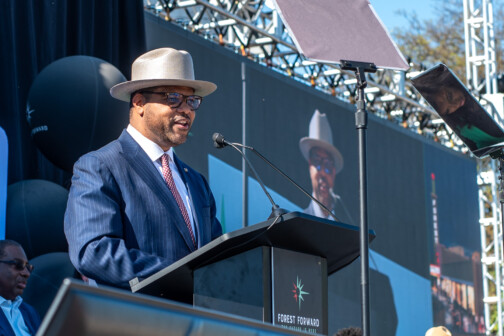Chris MacFarland had his eyes set on one main target when he joined Plano-based Masergy Communications in 2008: Take the company from startup to an established, fast-growing business. After Masergy agreed to be acquired recently by Boston-based private equity firm Berkshire Partners LLC for a figure that could approach $1 billion, some might argue that he’s already hit the bullseye. “I’m not surprised at all,” says Jack Tankersley, a founding investor in Masergy and a former board member. “Chris is one of those CEOs who has the capability to take the company from where it is to a new level.”
Berkshire snapped up Masergy from ABRY Partners, another Boston private equity firm that had acquired the Plano networking-solutions company in 2011 for $210 million. Berkshire’s deal was reportedly worth more than $900 million, according to Reuters, and was expected to close before the end of 2016.
It also was one of several recent success stories for Dallas-Fort Worth’s growing startup community. In the past five years, the local startup community has experienced a resurgence. Investment groups have come out of the woodwork to fund the upstarts, and incubators and co-working spaces have popped up across the region. But large successful exits have been more rare.
Some say such exits could push DFW’s startup scene toward a higher profile nationally, creating additional resources for entrepreneurs. This idea may have been best described by national organization Techweek, which hosted its first conference in North Texas in October 2016. Techweek calls big, high-growth businesses that attract buyers and investors “hero companies.” Once a hero company develops in a region—and especially if it has a high-profile exit—it leaves behind experienced top tech talent, lures other investors to the region, and often creates a separate set of spinoffs. As a result, one hero company often creates a ripple effect, helping others become hero companies, too.
“We’re all ecstatic there’s a fourth chapter of masergy. we’re preparing for very robust growth.”
Chris MacFarland, Masergy
While Masergy might not be large enough to be considered a hero company yet, MacFarland and his team agree they’re well on their way. “We’re all ecstatic that there’s a fourth chapter of Masergy,” says MacFarland, referring to the startup phase, his joining the company, and its first sale to private equity firm ABRY as the first three chapters. “We’re preparing for very robust growth going forward, and [the sale] gives us the luxury to invest where we want to.”
Masergy, which employs 479 people, ended its latest fiscal year with $276 million in revenue from 1,200 customers in 80 countries. The latest financial results represent an increase of $156 million in revenue and 500 customers from six years ago, when ABRY bought the company.
Masergy’s rapid growth and two sales have been a result of MacFarland’s leadership, Tankersley says. MacFarland joined Masergy, which provides networking solutions, in 2008 as the chief operating officer under CEO Barry Nalls, who’d founded the company in 2000. The COO had more than eight years of experience as the chief technology officer for two other communications firms, Iowa-based McLeodUSA Inc., which was bought by PAETEC Holding Corp. in 2008, and Dallas-based Allegiance Telecom, which sold to XO Communications. It became clear to the board that his expertise was invaluable.
“We all knew it wasn’t going to be long before Chris would be CEO,” Tankersley says. “It was time to move from entrepreneurial leadership to someone more experienced in leading large enterprises.”
And, once MacFarland got into the corner office, he instantly had an effect on the business. The company, which previously suffered from network reliability issues typical of a small company, was able to halt such outages, Tankersley remembers. MacFarland’s operational efficiency stood out, as did his ability to build and retain a strong team, he adds.
A Long-Term Vision
But, MacFarland says he was just doing what needed to be done to take the company to its next stage of growth. “Back in 2010, the management team built a three-year vision and a 10-year vision that showed there was need and opportunity to be in places we were not,” MacFarland says, citing goals including leveraging enterprise customers. “One was the absolute need to find the capital needed for the business to grow in products, and to look for opportunistic acquisitions.”
Masergy filed for an initial public offering for up to $100 million in October 2010. But, citing concerns over “the current pricing environment” for IPOs, the company withdrew its filing in February 2011. Six months later the company struck a deal with ABRY, which completed the acquisition in August 2011. The new infusion of capital allowed Masergy to make buys like its 2012 purchase of Broadcore, a unified communications company that generated about $8 million in revenue at the time, MacFarland says. Masergy followed that purchase with the 2014 acquisition of Global DataGuard Inc., a security-services provider. Masergy’s sale to ABRY also made the company more attractive to other firms.
“Since 2011, we’ve had companies and private equity firms reach out to us, looking to invest in or acquire Masergy,” MacFarland says. And this year, when the company was finally ready to seek its next steps, MacFarland hired advisors who discovered that investor interest in the company remained strong. “There was a lot of interest, more than we expected, and it ended up taking a lot of work and a lot of time,” he says.
Masergy received inquiries from 18 interested parties, and, with the help of its advisors, whittled that down to a handful. Berkshire ended up being the best match, says MacFarland. It also helped that ABRY previously had co-invested with Berkshire, making it a more familiar party to the seller. Neither Boston firm would comment for this article.
Berkshire, founded in 1984, has made more than 115 investments specializing in such fields as consumer products and retail, business services, industrial, transportation, and communications. In 2015, the firm invested in companies including North Carolina-based fitness product designer and distributor Implus, Indonesia-based wireless tower company Protelindo, and North Carolina denture and implant service provider Affordable Care Inc. It also linked up with New Balance Holding Inc. to buy Massachusetts-based shoe company The Rockport Group. And, about a month before purchasing Masergy, Berkshire sold New York-based Telx, a colocation and interconnection service company it acquired with ABRY in 2011, to Digital Realty Trust in a deal valued at $1.89 billion.
“They bring incredible expertise in capital structure,” MacFarland says of the Massachusetts private equity firm. “They’re extremely engaged in dialogue with me and the executive team. We expect another robust chapter of Masergy.”
With the fresh capital resources, Masergy expects to rapidly grow its team by about 130 people, McFarland says. It also could acquire new assets as it continues to create solutions across three categories: cloud communication, managed security, and hybrid networking.
McFarland recognizes that while his deal was huge for his company and large for DFW, it wouldn’t be considered a “mega deal” across the national technology landscape. “There haven’t been many billion-dollar-plus deals in this community,” he says, adding that companies like his still add value to the region’s business community. “What you’re seeing is we’re committed to North Texas, and we’ll continue to grow here.”
While Tankerlsey, the founding investor, has full faith in MacFarland and his team, he’s also aware of the challenges Masergy could face. “The companies which it tends to compete most aggressively with are facilities-based, capital-heavy competitors,” Tankerlsey says, adding, however, that Masergy has the momentum that its larger rivals lack.
“As it grows, it will lose that nimbleness it has as a competitive advantage,” he says. “That’s not necessarily a concern, but it’s a risk the [Masergy] board will monitor.”
Danielle Abril is the managing editor of D CEO.







